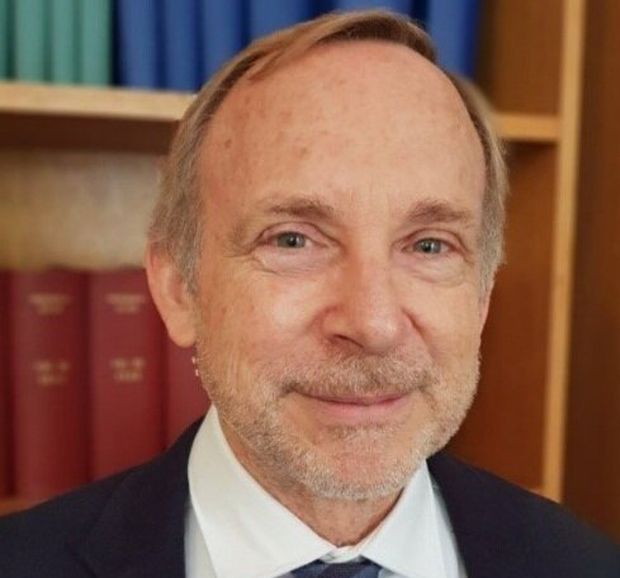Reflections on European Values Survey: Interview with professor David Voas
There is increasing cultural diversity that works against the traditional beliefs. The critical factor is the extent to which religious involvement is transmitted to the younger generation.
01 JUNE 2021 · 12:00 CET

Professor David Voas is Professor of Social Science at the University College London Institute for Social Research, where much of his work concerns religious change in contemporary societies.
He was Chair of the European Values Survey Theory Group, who are responsible for developing the questionnaires, and a member of their Executive Committee. Until recently he was also EVS’s National Programme Director for Great Britain.
We spoke to Prof. Voas about his work with EVS and asked him to reflect on our analysis of the 2017-2020 data.
JA: Over the past ten years there have been a lot of changes in Europe, such as the migrant crisis and Brexit. In your opinion, how have these changes influenced secularisation and religious practice?
DV: The factors at work are very similar to those that have been operating for several decades. There's continuing growth in competition for people's time and attention from secular sources, but of course things like social media have really taken off to tremendous extent.
There is increasing cultural diversity that works against the maintenance of the traditional beliefs and practices; the continuing growth of individualism and personal freedom as well as decline in traditional authority.
Alongside this, I think there's been a continuing shift towards goals, objectives or arguably values that seem secular rather than religious, so the church is perceived by some people as being out of date on gender equality, sexual orientation and reproductive freedom.
It's been ineffective, in some people’s view, on priorities like protecting the environment or promoting social justice. Pronouncements on morality are unwelcome generally and the church lacks legitimacy because of scandals of various kinds. All of these things have tended to work in the secularising direction.
It’s helpful to note that secularisation is essentially a generational process, so it's not about people in adult life deciding that they are no longer interested in going to church, although that does happen.
The critical factor is the extent to which religious involvement is transmitted to the younger generation. There is a very slow but somewhat inexorable process of generational replacement where the older more Christian segments of the population die off and are replaced by younger, less religious people.
Although it's interesting and important to look at the recent past, this is a very long-term trend, reflecting how society has changed during time spans measured literally in generations.
JA: Thinking about this longitudinal aspect are there any trends within that the new data that has surprised you?
DV: Overall, I'd say it's very much as I would have expected. I like the way that you've distinguished ‘frequent attendance’ from ‘ever attending’ and pointed out that in the Nordic countries there is the phenomenon of very high levels of affiliation with national churches, and people see belonging to the national churches being almost part of being Danish or Swedish or Norwegian or Finnish but they really not very religious.
By contrast countries like Britain, France, Czech Republic have a larger kernel of frequent church goers but also majorities who never attend at all.
JA: We used six specific EVS questions in our index. Are there any different or additional questions it would have been good to include within EVS data to help capture changes in secularity?
DV: You'll be aware that with these repeated cross-sectional surveys we are more or less obliged to repeat the questions which were there last time because we want to look at the trends. It’s not so much that I'd like to see completely new or different questions: it's more that in some cases I’d like to see slightly better versions of the questions we do have.
For example, I don’t think a yes/no answer for ‘do you believe in God?’ captures the complexity of people’s theistic leanings. The International Social Survey Programme has a much better question, with six possible responses ranging from ‘I don't believe in God’ through to ‘I know God really exists and I have no doubts about it’ with various points in between, so that's a direction that I would ideally like to go in.
With regard to the self-described religiosity question which asks ‘do you consider yourself to be a religious person, not a religious person, or a convinced atheist?’, often no one's really quite sure what the difference between ‘not a religious person’ and ‘a convinced atheist’ actually is and a lot comes down to the cultural acceptability of claiming the atheist label.
In France this is high because people are happy enough to see themselves as atheists, but it can be very low elsewhere as even quite unreligious people shy away from an atheist label that seems very unyielding.
The most common survey question about religion is ‘Do you regard yourself as belonging to a religious group and if so which?’. You don’t include that, and I think that’s the right decision, as the answers are subject to quite considerable cross-national differences in history and culture.
As we indicate above, in Scandinavia a huge proportion of people say ‘yes absolutely, we belong to the church’ but that's not the same thing as believing or practice.
In other countries people are increasingly happy to say ‘I have no religion now’ but that's not to say they are less religiously or spiritually inclined; it just means that it is easier to say that you have no affiliation.

JA: What influence do you think that migration has had on the statistics in regard to religious belief and practice?
DV: I think first of all, although we now have substantial Muslim minorities in Western Europe which have offset the decline in average religiosity to some extent, we are still talking about a relatively modest proportion of the adult population, in the region of five to ten per cent.
Moreover, immigrants and minorities tend to be undercounted in social surveys so if you look at unweighted data, their share is even lower in surveys.
An example of the impact of the migratory population is seen with a question within the International Social Survey Programme question around belief in God. Muslims now are significant share of those identifying in the most religious or theistic group.
So in countries like Britain, they account for something like a quarter of those very firmly theistic people even though they are a small portion of the population. Having said that, even if they are indeed very different, they are not going to swing the overall average very far.
In addition, because governments are concerned now with social cohesion and religious accommodation, the existence of this important minority has I think pushed religion to the fore in a way that otherwise wouldn't have been the case.
Second and subsequent generations of Muslims are more or less the same in terms of average religiosity as their parents, but there appears to be much more dispersion of belief and practice than with their parents.
To grossly simplify, in a sense their parents brought with them the practices and worldviews of their countries of origin, which were all fairly standard. Following settlement, the next generation shows much more diversity, with some being highly secular and acting just like their peers but others who become very devout and so go to the other extreme.
Over quite a long time I would expect them to be subject to the same secularising forces as everybody else, but of course it remains to be seen.
JA: And I suppose sometimes the experience of being in a minority makes people more likely to hold onto their faith?
DV: Absolutely, there is definitely some kind of ethno-religious defence mechanism where precisely because of the salience of that religious identity they are perhaps pushed to assert and even practise as a way of defending their identity and the group that they belong to.
How long that sort of phenomenon will be apparent remains to be seen but it depends largely on what the wider society does in assimilating or integrating these groups.
JA: You mention that immigrants and minorities tend to be undercounted in surveys?
DV: In social survey terms, as a result of disadvantage many religious minorities typically are hard to reach for several reasons. They may not be on various lists that you would use as sampling frames or they may not be so available or willing to be surveyed.
In many cases there can be a language barrier. Social survey agencies are very aware of this and typically the data collected are weighted so that they become the appropriate share of population.
But we shouldn't overlook the fact of course that the Muslims for example you do manage to include in your survey may not be representative of the whole community, so weighting isn't a panacea.
JA: We also picked up that Germany in particular seemed to be a bit of an outlier, do you have any thoughts on that?
DV: Yes, I do, though I'm not sure they will be very satisfactory! Our impression from other sources is that the trends in the former West Germany are very similar to those seen elsewhere in Western Europe.
The former East Germany was possibly the least religious country in the world. While religious involvement there has increased a little, I doubt that it's by enough to push up the average for the whole country significantly.
Your secularity league table for the previous EVS wave placed Germany at number two, which does seem surprising to me. The latest ranking of ninth seems more in line with what I'd expect, so if it's a matter of survey error I believe it's the earliest survey that exaggerated the secularity rather than the current one over-estimating religiosity.
The biennial European Social Survey asks about self-assessed religiosity. In Germany this has gone up and down over the past two decades and as it happens, the value for the most recent survey in 2018 is actually the lowest it's ever been in Germany, though not by a huge amount.
There's really no evidence in the ESS that religiosity is gone up in the past decade, so I think on the face of it we probably seeing some kind of error in the EVS results.
JA: You said most of the data was collected between 2017 and 2019. Obviously in 2020 everything changed and the world went upside down. What do you think the impact of Covid will be on people’s values?
DV: With regard to values, people have been forced to reflect on what's important. You could argue that this will lead to a burst of hedonism as everyone goes off and tries to make up for lost time in travelling, carousing and enjoying themselves in all of the ways they haven’t been able to over last year.
Of course, many people have also been faced with acute losses of contact with family and friends and community generally. It may be that they will in a sense rediscover the importance of family and community.
If one were cynical, you might say there's always a tendency in these extreme moments to think ‘life will never be the same, and I'll make sure that I do X,Y and Z as soon as I'm able to’, but six months down the line we are back just sitting in front of the television.
I think it is an interesting and important question and while I think that there will be some long-term impacts, it's very hard to predict what those might be.
Jo Appleton, researcher and writes about mission in Europe for Vista Magazine.
This article first appeared in the May 2021 edition of Vista Magazine.
Published in: Evangelical Focus - Vista Journal - Reflections on European Values Survey: Interview with professor David Voas
